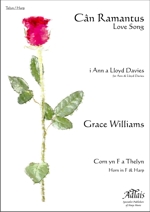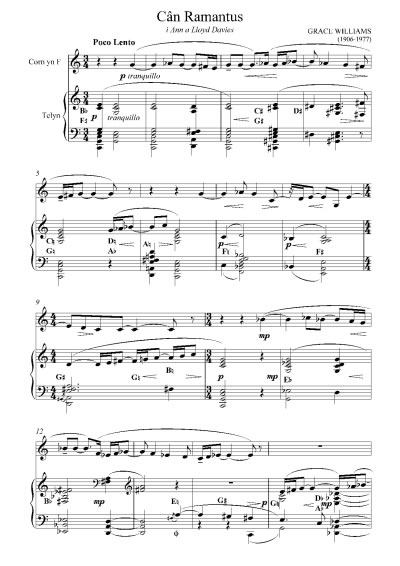 |
|||
| |
of Harp Music |
| © 2004-2025 ADLAIS |
| Cân
Ramantus
Love
Song Grace Williams (1906-1977) ed. Ann Griffiths |
return to previous page |
 |
Work: | Duet for Horn in F & Harp |
| Catalogue No: | Adlais 168 | |
| ISMN: | 979-0-57032-149-0 | |
| Edition: | September 2009, A4 stapled, set of parts | |
| Duration: | 3' 45 " minutes | |
| Suitable for: | Grade 7 Horn in F & Pedal Harp | |
| Price:: | £10.00 Go to shop | |
CÂN RAMANTUS for HORN AND HARP It is difficult to imagine a more delightful wedding gift than that which Grace Williams gave to Lloyd Davies and Ann Griffiths on the occasion of their marriage on 2 May 1959. Lloyd Davies, a medical practitioner in Abergavenny, played the horn, whilst his wife was the harpist Ann Griffiths. Fifty years later, in the year in which they would have celebrated their golden wedding, Cân Ramantus is published for the first time. The Welsh word Cân has the meaning of both Song and Poem, and Cân Ramantus can be translated either as Love Song or as Love Poem. Grace Williams (1906-1977), highly respected, but sadly underrated and under-performed, was a composer of remarkable talent. Born in Barry, South Wales, Grace Williams was not Welsh-speaking, but nonetheless her music is recognisably, distinctly and uniquely Welsh in flavour. The declamatory, quasi-improvisatory element in her music is related to the Welsh art of Penillion singing (Cerdd Dant), and in fact in 1955 she wrote an orchestral work entitled Penillion for the National Youth Orchestra of Wales. The musical rhythms echo the stresses of the Welsh language, particularly of poems in the alliterative cynghanedd (strict) metres. In the words of her biographer, Malcolm Boyd “….the accent on the penultimate syllable of polysyllabic words, a feature of the language, is paralleled in the music by phrases which end with an accented short note, followed by an unaccented long one”. Melody in its widest sense provided the impulse for all her compositions, and song-writing spanned the whole of her career – indeed, the horn's soaring melody in Cân Ramantus could be described as a song without words. Grace Williams's favourite instruments were the trumpet and the harp. Intensely self-critical (she would occasionally have what she called in her diary 'A Day of Destruction'), a proposed 'Serenade' for two harps and orchestra was destroyed, as was Yr Helfa (La Chasse), companion piece to Hiraeth, the wonderfully elegiac short poem of longing, written for Ann Griffiths and first heard on French television. Her three Songs of Sleep (1959) for soprano, alto flute and harp, were commissioned by Dr Lloyd Davies and dedicated to Ann Griffiths. There were many songs with harp accompaniment. Sadly, these, and far too many other works remain unheard and unpublished. Adlais is privileged to be able, to some small extent, to make amends with the publication of Cân Ramantus, with the hope that more of the legacy of this wonderful Welsh composer will become available and lead to a wider appreciation of her work.
|

